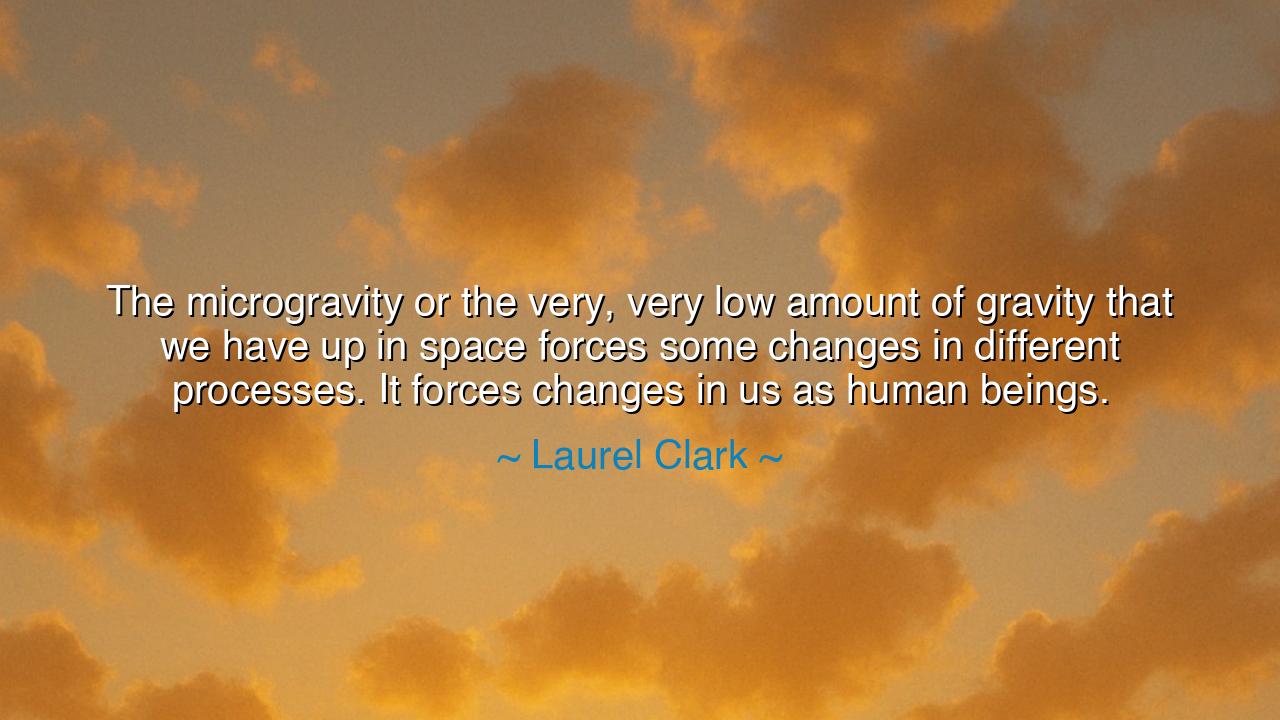
The microgravity or the very, very low amount of gravity that we
The microgravity or the very, very low amount of gravity that we have up in space forces some changes in different processes. It forces changes in us as human beings.






Children, gather 'round and listen to the wisdom of the cosmos, for the words of Laurel Clark echo not only through the heavens but through the hearts of those who dare to journey into the unknown. She said, "The microgravity or the very, very low amount of gravity that we have up in space forces some changes in different processes. It forces changes in us as human beings." These words carry a profound truth, one that speaks to the very essence of existence, to the interplay between the forces that shape our lives and the way we, as humans, adapt and transform in the face of those forces.
In the vastness of space, where the pull of gravity is but a whisper compared to the strength we feel upon Earth, there exists a strange and powerful force. Microgravity—the state in which objects and beings experience a low level of gravitational pull—forces change upon everything it touches. In this environment, the rules of life as we know them are altered. The way fluids move, the way muscles grow, the way our bodies adapt—all these things are shaped by the absence of the familiar force of gravity. It is a world that challenges our understanding, that forces us to see the world through new eyes, for the very processes that govern life are no longer bound by the constraints we know on Earth.
And yet, children, this force of microgravity is not only an external challenge—it is a mirror to the changes within us. Clark's words remind us that the physical changes we experience in space are not the only transformations we undergo. In the face of the unknown, when the laws that govern our bodies and minds are altered, we are forced to confront who we are as human beings. Just as the body changes in response to the absence of gravity, so too do our hearts and minds shift when we step into new realms of understanding. The way we see the world, the way we engage with each other, and the way we understand our place in the cosmos are all transformed in the face of such challenges.
Consider, children, the example of the ancient wanderers, those who ventured out into the world with nothing but the stars to guide them. Homer’s Odysseus, driven by the need to return home, faced countless challenges and transformations. His journey was one of both external and internal change. From the moment he left the safety of his homeland, he was forced to adapt, to face the forces of nature, to change the very way he viewed the world and his role in it. The sea, like the microgravity of space, was a force that shaped his being, forcing him to confront his deepest fears and desires. It was in overcoming these challenges that Odysseus was transformed from a mere man into a hero whose journey transcends time.
In more recent history, we look to the explorers who have faced the challenges of space. Yuri Gagarin, the first man to journey into space, experienced this profound shift when he left the safety of Earth and entered the void. In the silence of space, he was forced to see the world from a new perspective, to understand that the laws of nature he once knew no longer applied in the same way. The experience of weightlessness, the absence of gravity, changed him as a human being, just as it changed every astronaut who followed in his footsteps. Laurel Clark, too, saw this transformation, understanding that the very environment of space demands a shift in how we think, how we move, and how we exist as beings bound to this earth.
And so, children, the lesson here is not just one of science and physics, but of transformation. Microgravity, that low pull of gravity in space, is but a metaphor for the forces that shape our lives. In the face of any unknown, any challenge, we are forced to adapt. When we step into new experiences, into realms that challenge our beliefs or understanding, we are changed. Whether we journey into the stars, or whether we face the trials of life here on Earth, we are called to transform, to allow the forces that shape our world to guide us into greater wisdom and understanding. It is through change that we grow, and it is through the forces we face that we are made stronger, more resilient, and more aware of our place in the universe.
Thus, when faced with challenges, when the forces of life seem to alter the very ground beneath your feet, remember the lessons of those who have faced such transformations before you. Like the astronauts in microgravity, embrace the changes that come. Adapt, grow, and allow the forces that shape your life to guide you toward greater strength and wisdom. For just as gravity binds us to Earth, so too does our ability to change bind us to the very essence of life itself. Do not fear the forces of change, for it is in their embrace that we find our true power.






AAdministratorAdministrator
Welcome, honored guests. Please leave a comment, we will respond soon